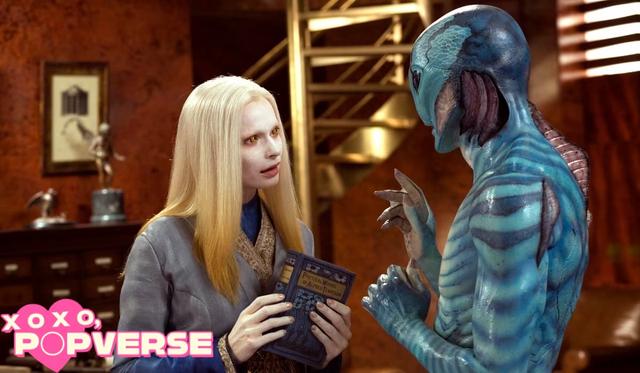If you click on a link and make a purchase we may receive a small commission. Read our editorial policy.
Long before The Boys and The Franchise, Marvel explored the dangers of Hollywood and superheroes with X-Statix
The X-Statix exist halfway between the neatly defined edges of the Marvel Universe and our own reality under capitalism and celebrity culture

Popverse's top stories
- DC Comics sends Absolute Batman, Absolute Wonder Woman, and the entire Absolute Universe back to press for a massive March rollout
- Creel World Seattle: Stranger Things' Jamie Campbell Bower is coming to ECCC 2026!
- Members only: Ask Ming-Na Wen, Critical Role, Gail Simone, Karl Urban, Chris Claremont, Denys Cowan, and more your questions as part of ECCC x Popverse member exclusive!
Superhero satires are all the rage right now. This fall, HBO unveiled a new comedy series called The Franchise, which provided a satirical look at Hollywood and its dependence on superheroes. Last year, Amazon released Gen V, a spinoff series from its wildly successful adaptation of Garth Ennis and Darick Robertson's The Boys. When I went to WonderCon, San Diego Comic Con, Los Angeles Comic Con, and New York Comic Con this year, I saw far more people cosplaying The Boys' Homelander than Captain America or Superman. The Franchise, Gen V, and The Boys all have a sharp edge to them, but I think it's also time we honor one of their progenitors: X-Statix.
The X-Statix from Marvel Comics might be the greatest X-Men team you've never heard of. If you're now scratching your head, running through the annals of X-Men lore and wondering when, if ever, a team called The X-Statix ever did anything to change the trajectory of mutantkind forever, you can stop right now. Because nothing like that ever happens in Peter Milligan, Michael Allred, and Laura Allred's X-Statix books. They've got no 'Dark Phoenix Saga', no 'Days of Future Past' storyline. And that's the whole point. They practically exist halfway between the neatly defined edges of the Marvel Universe and our own reality under capitalism and celebrity culture. They lack the operatic scale of so many X-Men stories because the series focuses on how enterprising mutants try to make the most of their oppressed position through capital.
The X-Statix were already joking about Hollywood's superheroes long before The Boys' comic book series was ever published, much less adapted into a TV show by Amazon. Their punchline is simple: they're a group of marginalized people whose differences power a billion-dollar superhero franchise, betraying the values of their community in the process. For that reason, we've never needed them more than we do right now. The central idea behind The X-Statix can apply to so many different areas of today's pop culture landscape.
Unlike The Boys, The X-Statix were never interested in a question of, 'What if the Justice League was bad' or subverting superhero power fantasies. Instead, they dig into the personal and societal costs of when an outsider suddenly possesses market cachet. Milligan and the Allreds' story captures in visceral (but never gratuitous) detail the bloody trail that tokenization leaves behind. Beyond the mutant metaphor and its application to any number of marginalized groups, the dynamic at play in X-Statix reflects the Marvel Cinematic Universe's trajectory from being perceived as something only 'nerds' cared about, to a force of global monoculture, taking over every cinema screen at the Times Square AMC, regardless of whether or not anyone actually buys a ticket.
Marvel's X-Statix showed the complexities of trying to survive as a mutant

With the MCU set to introduce the X-Men proper sometime soon, it feels timely to revisit X-Statix. The X-Statix's headquarters are in Santa Monica, just a stone's throw from Hollywood without accounting for traffic. They exist to sell merchandise, entertain the masses, and participate in press conferences. The team runs on tokenism, as press materials proudly announce the team's acquisition of a gay hero from San Francisco formerly called 'Rainbow' alongside a mutant called 'Phat,' who was reportedly brought up in a trailer park. Of course, that isn't true, Phat was raised in an affluent community, but it's the poverty narrative that matters to the public. Let's also not forget the X-Statix member U-Go Girl, whose teleportation powers are primarily used to get the team from place to place. On The X-Statix, you're there to say your lines, hit your mark, and try not to get into trouble on your way home.
Within the world of the book, The X-Statix represents the dilution of the mutant metaphor under capitalism. That is, the plight of mutants as marginalized people has been transformed into a marketable spectacle that destroys the lives of its team members. And this happens quite literally, as some members are introduced and killed off as quickly as the span of one issue. Its resident cameraman member, Doop, films everything, and footage of the team's missions is then edited and broadcast to the public. The spectacle is king, regardless of the violence it brings to the mutants themselves. Through this media apparatus, the mutants' humanities are taken away as their bodies are commodified. If one toy breaks, then there's plenty more to replace it with.
It's an ethos that other, more famous mutants like Cannonball, Domino, and Meltdown take issue with. Cannonball, a New Mutant who originally got his powers in an impoverished coal mining area in Appalachia, tells X-Statix member, Anarchist, in X-Force #117 that the team has "no right to defile what better mutants before [them] created." Anarchist, ever the honest one, replies, "Have you seen our mortality rate?! Any of us could buy it at any minute! Why the hell shouldn't we enjoy the ride while we can?"
In effect, the X-Statix have a deeply cynical sense of both their status as mutants as well as the individualistic culture they were born into. Not every mutant has the moral backbone of Nightcrawler, nor the will to fight for their own dignity. In this sense, X-Statix was significant because it liberated Marvel's mutants from the moral expectations inherent to the superhero genre. The mutants in X-Statix aren't good or bad like the X-Men or the Brotherhood of Evil Mutants, they're just people. And people are complicated and often frustrating.
Marvel's X-Statix illustrates how the flip side to mutant liberation is mutant destruction

Everyone on The X-Statix is a freak, a dynamic familiar to anyone who's ever read X-Men comics, but their strangeness has an incisive edge to it. The team is led by a hunky but antennaed mutant called, I kid you not, Mister Sensitive. As his name suggests, the world is an excruciating place for Mister Sensitive: a blade of grass brushing against him might as well be a serrated knife. Aside from the fact that he's got bumpy, purple skin in addition to his antennae, Mister Sensitive's mutation makes it impossible for him to live "as a normal person." He's just too abject for the world. As a result, he broods better than Batman ever could, finding relief only in playing Russian Roulette with himself every night.
Mister Sensitive doesn't have the noble qualities of whoever your favorite mutant leader is. He doesn't even want to be leader of the team, but he admits that the limelight is "all I'm cut out for. Without it, I'm just... another mutant." With this character, X-Statix solidified its critique of tokenism and capitalism: the life of fame that Mister Sensitive seeks out is one that he knows can only end in his death -- whether by Russian Roulette or on The X-Statix. It's a dark idea, but X-Statix illustrates how some mutants can only survive by bringing about their own destruction. It's death by consumption, and they're the ones being consumed. It's the exact opposite of the mutant liberation that the X-Men fight for.
Whereas other superhero satires are led by cartoonishly evil figures like Homelander and Omni-Man, the X-Statix's Mister Sensitive is a lot like Barbie in Greta Gerwig's 2023 film: he thinks about dying a lot. But that doesn't soften the blow of X-Statix's darkest elements. Like Barbie, he knows he's a product that carries a loaded history and set of assumptions. He exists partly as a way for society to determine what its own tastes are. One X-Statix panel shows a magazine with Mister Sensitive's purple face on it, with the caption, "Sexy? The New Standard." But even if society needs figures like Mister Sensitive to understand itself and what it wants to be, that doesn't mean that it includes Mister Sensitive and mutantkind to begin with. As the members of X-Statix mourn a fallen member in X-Statix #18, Anarchist asks, "Was it necessary to sell the syndication rights for Phat's funeral?" In reply, Mister Sensitive says, "Sure. This is all part of being accepted again. Let them see the price we pay to be an X-Statix." Regardless of how selfish Mister Sensitive can be, it's hard to not be touched by how blindly optimistic his comment is. As X-Statix reveals, the team's mutants aren't seen as members of society, but rather images to be consumed, even in death. If that makes the rest of the team a bit of cash, then so be it.
Despite the fact that Milligan and the Allreds debuted The X-Statix in 2001, the team may be too sharply satirical for the MCU today. Given the financial success of Deadpool and Wolverine earlier this year, there may be a ceiling to how much the average moviegoer can tolerate. Deadpool and Wolverine was child's play compared to both the irreverence and depth of Peter Milligan and Michael and Laura Allred's X-Statix. If none of the characters ever make it to the big screen (beyond the vomiting villain, Zeitgeist, who was introduced in Deadpool 2 and then killed minutes later), then that's okay. The work done on X-Statix's comics will remain, and Milligan and the Allreds will get the last laugh.
Get ready for what's next with our guide to upcoming comics, how to buy comics at a comic shop, and our guide to Free Comic Book Day 2025.
Follow Popverse for upcoming event coverage and news
Find out how we conduct our review by reading our review policy
Let Popverse be your tour guide through the wilderness of pop culture
Sign in and let us help you find your new favorite thing.
















Comments
Want to join the discussion? Please activate your account first.
Visit Reedpop ID if you need to resend the confirmation email.